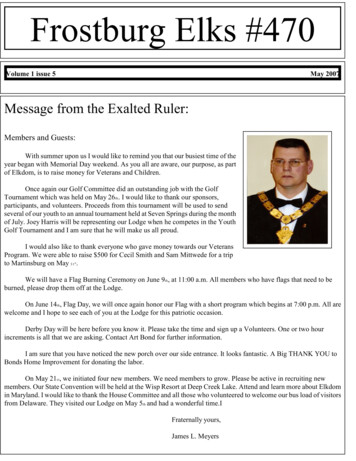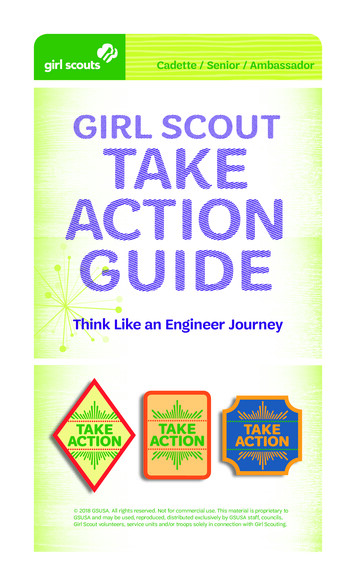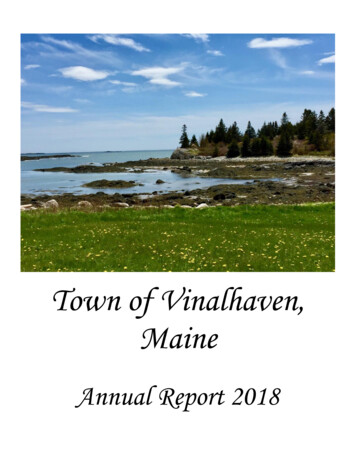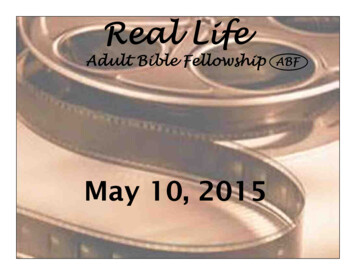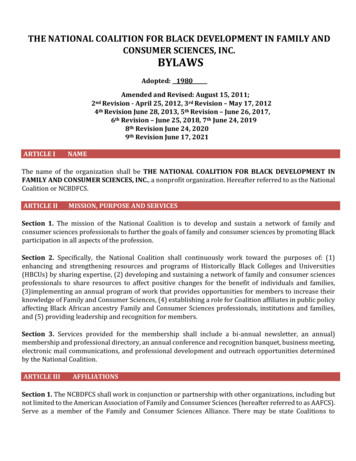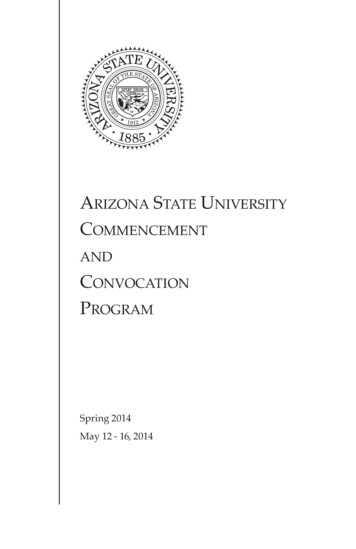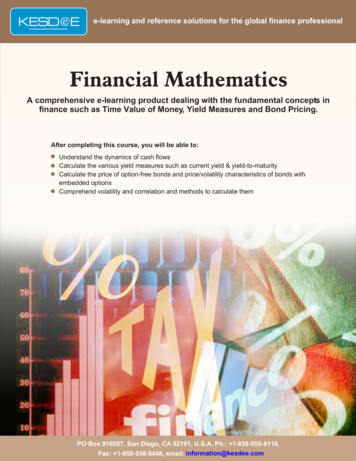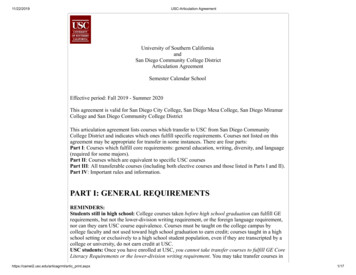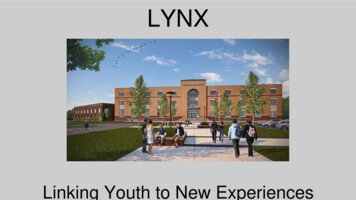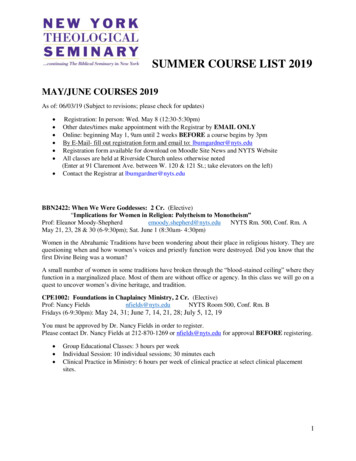
Transcription
SUMMER COURSE LIST 2019MAY/JUNE COURSES 2019As of: 06/03/19 (Subject to revisions; please check for updates) Registration: In person: Wed. May 8 (12:30-5:30pm)Other dates/times make appointment with the Registrar by EMAIL ONLYOnline: beginning May 1, 9am until 2 weeks BEFORE a course begins by 3pmBy E-Mail- fill out registration form and email to: lbumgardner@nyts.eduRegistration form available for download on Moodle Site News and NYTS WebsiteAll classes are held at Riverside Church unless otherwise noted(Enter at 91 Claremont Ave. between W. 120 & 121 St.; take elevators on the left)Contact the Registrar at lbumgardner@nyts.eduBBN2422: When We Were Goddesses: 2 Cr. (Elective)“Implications for Women in Religion: Polytheism to Monotheism”Prof: Eleanor Moody-Shepherdemoody.shepherd@nyts.eduNYTS Rm. 500, Conf. Rm. AMay 21, 23, 28 & 30 (6-9:30pm); Sat. June 1 (8:30am- 4:30pm)Women in the Abrahamic Traditions have been wondering about their place in religious history. They arequestioning when and how women’s voices and priestly function were destroyed. Did you know that thefirst Divine Being was a woman?A small number of women in some traditions have broken through the “blood-stained ceiling” where theyfunction in a marginalized place. Most of them are without office or agency. In this class we will go on aquest to uncover women’s divine heritage, and tradition.CPE1002: Foundations in Chaplaincy Ministry, 2 Cr. (Elective)Prof: Nancy Fieldsnfields@nyts.eduNYTS Room 500, Conf. Rm. BFridays (6-9:30pm): May 24, 31; June 7, 14, 21, 28; July 5, 12, 19You must be approved by Dr. Nancy Fields in order to register.Please contact Dr. Nancy Fields at 212-870-1269 or nfields@nyts.edu for approval BEFORE registering. Group Educational Classes: 3 hours per weekIndividual Session: 10 individual sessions; 30 minutes eachClinical Practice in Ministry: 6 hours per week of clinical practice at select clinical placementsites.1
JUNE 2019BBN2413: Women in the Second Testament; 3 Cr. (Elective)“How Women Were Leaders and Mentors”Prof: Eleanor Moody-Shepherdemoody.shepherd@nyts.eduJune 11, 13, 18 (6-9:30pm) & Saturdays June 8, 15 (8am-5pm)Rm. 500 Conf. Rm. AThis course will seek to help students understand the role of women in the New Testament as a paradigm forunderstanding women’s role in salvation history. The exploration of the text will be through the social,political, and theological perspectives of the time in which the women lived. Given those realities, the classwill struggle with the church’s dilemma in addressing the role of women in the leadership and cultic functionsin the contemporary church. Students must read the assigned reading before coming to class, which will beposted on “Moodle” by May 1.EMU2913: Hospitality: The Politics of Empathy in Religion and The State; 3 Cr. (Elective)Prof. Jill Schaefferjschaeffer@nyts.eduRm. 314 (EXCEPT: June 10: Multi-Purpose Rm 1st Fl)June 3, 5, 10, 12, 17, 19 (6 – 9:30pm) plus Sat. June 8 (8:30am – 4:30pm)Empathy and Agape are related thoughts on how to love the "Other." Agape, God's natural affection forcreation and intent upon its well-being and empathy, the human equivalent towards one's neighbor, arefound in political and religious life as far back as Gilgamesh, the Sumerian tyrant who suffered and becamea beloved king (ruled between2800 - 2500 BCE); the Hindu concept dharma appearing int he Rig Vedas(1500-1200 BCE) practices confirming and harmonizing with the cosmic order, and the Tao of Lao Tzu,(500BCE) the Way of Harmonious Compassion in the cosmos. Focus rests upon how one relates to many,how "I" relate to someone(s) other than myself. Order and flourishing can be maintained and enriched bythese "good" or "right" relationships among self, world and transcending truth. This course highlightsmoments and artifacts of empathy in a few contemporary political and religious systems and, by doing so,also demonstrates how a lack of political or religious empathy through strategies of indifference andviolence harms the very "systems" of order and flourishing it pledges to protect.MMU0133: Writing Skills for Theological Education; 3 Cr. (Elective)Prof: Esther Owenseowens@nyts.eduRm. 321Saturdays June 1, 8, 15, 22 (8am-4pm)This is an intensive writing course designed to give training in the fundamentals of expository andargumentative writing. The main emphasis is on giving students practice in organizing ideas into coherentlystructured and effective essays, using as a focal point their own unique experiences. Students areencouraged to look deeply into these experiences and to see them from shifting points of view.In the course, writing is viewed as a means of communication as well as a means of inquiry, a way ofthinking. To this end, the course focuses on analyzing the organizational patterns of various modes ofwriting and of paragraphs in relation to their development of entire essays. Problem-solving strategies forwriting and concepts of critical thinking are explored. In addition to an examination of the four basic formsof writing, the research procedure and exegetical approaches are introduced. A study of grammar isincorporated into the study of writing, based on the needs of the students enrolled.MPC2623: Group Counseling; 3 Cr. (Elective)Prof. Dorothea Criteshithea2012@gmail.comRm. 318June 4, 6, 11, 13, 18, 20 (6-9:30pm) & Sat. June 8 (8:30am-4:30pm)Today Pastoral Care and Counseling in congregations and in agency settings rely upon and benefit greatlyfrom our understanding of group theory and process. This course will explore the history, theologicalperspective and process of working with individuals in group contexts and with group experience as awhole. Aspects of group theory and process will be explored through readings, discussions, and in-classgroup process. A primary goal of the course is to assist students with knowledge of group dynamics leadingto more effective leadership in groups in their professional roles. Students will develop their own proposalfor a group.2
MRE2513: Strategies for Effective Teaching; 3 Cr. (Elective)Prof: Maritza Ortiz-Cruzdr.maritzaortizcruz@gmail.comMeets: Rm. 320 (EXCEPT: June 10, Rm. 20T; June 24: Multi-Purpose Rm. 1st Fl)June 3, 5, 10, 12, 17, 19, 24 (6-9:30pm) & Sat. June 15 (8:30am-4:30pm)This course will introduce students to a variety of strategies, methods, and techniques for teaching religionand theology in various environments. The course also offers students the opportunity to examine each ofthese strategies and to evaluate the effectiveness of these strategies for meeting their school and programexpectation. Students will acquire a working knowledge of contemporary models of religious educationthrough readings, theoretical analysis, case studies and personal reflection. They will be able to deciphermethodologies, theories and models germane to their communities or congregational context that willcontribute to social transformation.MRL2603: Charitable Organizations, Tax Law & Property Finance; 3 Cr. (Elective) CANCELLEDProf: Malcolm PunterMPunter@hcci.orgRm. 323June 17, 19, 24, 26 (6-9:30pm) & Sat. June 22 (8:30am-4:30pm) plus 1 online sessionUnder the U.S. federal tax system for churches and religious organizations are treated similarly, howeverChurches are distinguished by special rules under the Internal Revenue Code (IRC). The term church isfound, but not specifically defined, in the Internal Revenue Code (IRC). The term is not used by all faiths;however, in an attempt to make this publication easy to read, we use it in its generic sense as a place ofworship including, for example, mosques and synagogues. With the exception of the special rules for churchaudits, the use of the term church throughout this publication also includes conventions and associations ofchurches as well as integrated auxiliaries of a church.MYM2003: Youth & Family Ministry; 3 Cr. (Elective)Prof. Kathleen Turner kturnernyts@gmail.comMeets in: Rm. 316 (EXCEPT: June 10: 15T; June 24: 20T)June 3, 10, 17, 24 (6-9:30pm); & Sat. June 8, 15 (10am-2pm) PLUS other dates to be arrangedThis course explores how shifting social and cultural dynamics in the 21st Century have impacted ministryto youth and families in urban communities. Participants will be exposed to various models, theories andpractical skills needed to design effective family and youth ministries that are responsive to emergent trendsand challenges.3
TTU3273: Spiritual Formation: “Following the Movement of the Spirit” 3 Cr. (Elective)Prof: Humberto Alfarohalfaro@nyts.eduNYTS Conf. Rm. AJune 3, 4, 5, 6, 7 (6 –9:30pm) & Retreat Saturday June 8 (9 am – 9 pm)This course is about HOW to live a spiritual life in a world of constant motion and change. The courseexplores how to integrate the life of the mind to the heart following the movements of the Spirit knowingthat every movement varies with the individual and with one's season of life and community of faith. Themovements of the Spirit are never static, absolute, or perfectly completed. We do not have to graduate fromone movement to another before continuing our journey. In this course we will examine the following innermovements of the Spirit: 1) From False Identity to Agape Identity, 2) From Fear to Love, 3) From Shameto Vulnerability, 4) From Loneliness to Solitude, 5) from Life's Illusion to the Prayer of the Heart, 6) FromBitterness to Forgiveness and 7) From Exclusion to Inclusion. We will study the movements of the Spiritfrom a biblical and theological perspective in the light of the Eastern and Western traditions scrutinizingthe writings of Athanasius, Ephrem the Syrian, Basil the Great, Gregory of Nyssa, Gregory of Nazianzus,Maximus the Confessor, Gregory Palamas, Saint Anselm, Martin Luther, John Calvin, John Wesley,Sergius Bulgakow, and Karl Rahner. We will carefully explore the following questions: What exactly ismeant by spiritual formation and the movements of the Spirit (vero eorum spirituali formatione motusest Spiritus)? What are the origins of the term and the development of the concept in the intellectual historyof ideas? Is there a divine promise of spiritual formation and the movements of the Spirit implicit in theteaching of Scriptures? What are the constellations of interpretations of spiritual formation? What are thepossibilities, path and vertigo of spiritual formation and the movements of the Spirit? What are thecontemporary theological, ethical and ministerial problems, if any, with the integration of the life of themind to the heart and the polarities of our inner ecology? What is the ministerial relevance of spiritualformation and the movements of the Spirit as an experiential possibility?OTHER COURSES:Independent Study: Approvals required by faculty and Academic DeanSupervised Ministry:Prof: Nancy Fieldsnfields@nyts.eduMeets: June 1 to Aug. 31, 2019 (specific dates to be arranged individually with each student)Offered as independent study throughout the summer by approval only; contact Dr. Nancy Fields atnfields@nyts.edu for approval BEFORE you register.SMN1002: Supervised Ministry 1: 2 Cr. Yr. C, RequiredSMN2002: Supervised Ministry 2; 2 Cr. Yr. C, RequiredSMN3002: Supervised Ministry 3; 2 Cr. Yr. D, RequiredSMN4002: Supervised Ministry 4; 2 Cr. Yr. D, Required4
JULY 2019:HTU2063: History of the African American Church; 3 Cr. (Elective)Prof: Jermaine Marshalljermmar25@gmail.comMulti-Purpose Rm. (1st Fl)July 8, 10, 15, 17, 22, 24 (6-9:30pm) Sat. July 13, 20 (8:30am-4:30pm)This course provides a critical analysis into the origins, development, and growth of African AmericanChristianity. The course will focus on the trajectory of African American Christianity from the traditionalindigenous spirituality of Africa to the religious experiences of African Americans in the African Diaspora.While the course will focus on African American Christianity in the United States the course will alsohighlight the syncretism of other religious traditions in other parts of the African Diaspora such as Braziland the Caribbean.The course will interpret the history of the African American Church through an examination of slavereligion, development of the independent Black Church movement with special emphasis on the sevenhistorically Black denominations (African Methodist Episcopal, African Methodist Episcopal Zion,Christian Methodist Episcopal, National Baptist Convention USA, Incorporated; National BaptistConvention of America, Unincorporated; Progressive National Baptist, Church of God in Christ), the GreatMigrations, the Civil Rights and Black Power movements, the development of Black and Womanisttheologies, the Black Mega Church, and Challenges for the future of the African American Church.MMW2163: Church Seasons & Rituals; 3 Cr. (Elective)Prof. Edward Huntehunt@nyts.eduRm. Chapel of the Cross (3rd Fl.)July 15, 16, 17, 18, 19, 22, 23, 24, 25, 26 (6-9:30pm)One attends Seminary to learn all those things that will assist and guide them for their entire ministry. Butwith all the learning you can still find yourself in a state of awkwardness when it comes to performing theRites and Rituals of the church. This class will assist you to be better prepared to masterfully exercise yourLiturgical skills as well as your academic skills.We at NYTS desire that you be not only prepared academically to serve the church but that when you leavethe seminary you will be comfortable in the operations of the various Rites and Rituals of the church.During the course of study we will cover the following subjects: Baby Dedications, Baptism at Church,Home and Hospital, Dedication of Home / Business, Funerals, Meaningful Lord’s Supper (Communion) –Church, Home and Hospital, Planning and understanding the Lectionary Calendar, Reasons for the Orderof Service, Rites of Passage and Confirmation and Wedding that are common and based on denomination.This class is to assist you to be ready and comfortable to exercise your skills in any setting without fear.MPC2633: Healing Trauma; 3 Cr. (Elective)Prof: Sandra Bushnellsjbushnell@stny.rr.comRm. 330Begins On Site Sat. July 13 (8:30am-4:30pm)Continues with Remote Call-in Sessions, July 15, 17, 18, 22, 24, 25 (6-9:30pm)Concludes On Site Sat. July 27 (8:30-4:30pm)Students will (1) gain an understanding of various types of trauma, its effects on the brain, and the specialissues of survivors of abuse (2) develop a Biblical basis for healing trauma (3) learn and apply the CatholicProtestant theology of Spirit Christology by practicing an effective prayer model for healing trauma and (4)learn a support group approach. Historic urban models in NYC and other areas will be reviewed along withsome contemporary secular models. This hybrid course is beneficial for those overseeing or involved in theministries of marriage, youth, addictions, abuse, sex trafficking, chaplaincy, and healing.5
MRL2303: Theories & Practices of Organizational Leadership & Development; 3 Cr. (Elective)Prof. Nicardo Delahayenickemdel@yahoo.comMulti-Purpose Rm. 1st Fl. (EXCEPT: July 20: Rm. 20T)July 9, 11, 16, 18, 23, 25 (6-9:30pm) & Sat. July 20 (8:30am-4:30pm) & additional distance hours TBAThis course provides a broad introduction to the predominant biblical and theological frameworks forleadership in the Christian tradition. Each student will gain insight into the best practices of leadership inthe church, ministry organizations and the marketplace. Special focus will be given to specific leadershiptopics such as organizational theory, strategic leadership, servant leadership, systems thinking, visioncasting, conflict resolution, and change management. This practical yet critically nuanced course is intendedto aid students in gaining an appreciation for their unique leadership style and to develop strategies toenhance their leadership in religious and nonprofit settings.MYM1013: Youth, Church and Crisis in Ministry; 3 Cr. (Elective)Prof: Tamara Henrythenry@nyts.eduRm. 311July 9, 11, 16, 18, 23, 25 (6-9:30pm) & Sat July 6, 20 (8:30am-4:30pm)This course provides an understanding of the developmental, social and cultural crises impacting the livesof contemporary youth, within and beyond the church. Drawing insights from theology, psychology,sociology and education, participants will explore theories and concrete strategies for helping youthnegotiate the real-life difficulties that impinge on faith formation during the adolescent and young adultyears.SSU2963: Leadership Jazz in the City; 3 Cr. (Elective)An Intensive Seminar for Faith Leadership in the Urban EcologyAvailable for Supervised Ministry credit with prior permission from Dr. Nancy Fields nfields@nyts.eduFriday/Saturday, July 12/13, 2019, 9:30am – 4pm, Sunday July 15, by contractFriday/Saturday, July 26/27, 2019, 9:30am – 4pm, Sunday July 28, by contractProfs: Alfred Johnson and Arthur L. PressleyInterchurch Center, NYTS Room 500: Conference Room A (and other sites, to be announced)The United Nations world population study reports that more than half of the world population now livesin urban areas and that by 2050 nearly 70% will live in cities. Urban living brings with it exponentiallyincreased complexity and intersectionality which will call for faith leadership that can move with the musicof the city’s cadence. Using lessons learned from the Jazz, such as, improvisation, adaptability, a blendingof discord and harmony, we will explore how these elements, can shape effective leadership practices inthe urban environment. We will reflect biblically and theologically, ground ourselves in the sociopsychological effects of urban living and scan for various other leadership styles that can be relevant forthe urban context. This seminar will also include field placements.OTHER COURSES:Independent Study: Approvals required by faculty and Academic Dean6
AUGUST 2019BBH2133: Jonah in the Whale of a Digital World; 3 Cr. (Elective)Prof: Jin H. Hanjhan@nyts.eduNYTS Conf. Rm. AAug. 15, 16, 19, 20, 21, 22, 23, 26, 27, 28 (6-9:30pm)The story of Jonah and the big fish continues to inspire the imagination of all generations. In this course,we first approach the enchanting book of Jonah by exploring how it has been read, seen, and heard in artand literature through the centuries. We will also explore and devise effective ways to convey our findsthrough modern digital media in our times. In consonance with the agenda of the course, a good number ofthe sessions will be conducted through electronic tools online and offline. No prior technical knowledge isrequired. To benefit fully from the course, however, one will need willingness to learn new things and alaptop or desktop computer with stable internet connectivity.MMP2153: Preaching Under Construction; 3 Cr. (Elective)Prof: Edward Huntehunt@nyts.eduRm: Chapel of the Cross, 3rd Fl.Aug. 5, 6, 7, 8, 9, 12, 13, 14, 15, 16 (6-9:30 pm)Come and rediscover the joy of sermon preparation and preaching again as if for the first time! There willbe interaction and an exciting time for all involved. Each student will be required to bring at least five ofhis or her best sermons. We will work with your sermons, examine your style and challenge your deliveryskills. We also work on reaching a deeper depth and meaning in sermon development and thinking. Finally,we will also visit and examine the wonderful art of Celebration in Preaching.MRE2523: Youth, Culture and Pedagogy in Religious Education; 3 Cr. (Elective)Prof: Tamara Henrythenry@nyts.eduMeets in: Multi-Purpose Rm. 1st Fl. (EXCEPT: Aug. 3: Rm. 15T)Aug. 1, 6, 8, 13, 15, 20 (6-9:30pm) & Sat. Aug. 3, 17 (8:30am-4:30pm)This course explores the intersection between youth, culture and pedagogical practice within religiouseducation. In particular, it probes the challenges in engaging and religiously educating contemporary youthand young adults and examines how resources that emerge from popular youth cultures can fund moreeffective teaching and learning practices within youth and young adult ministry today.MRL2803: The Spirituality of Administration; 3 Cr. (Elective)Prof: Courtney Wiley-Harriscwiley@nyts.eduRm. 15T (EXCEPT: Aug. 24: Rm. 20T)Aug. 1, 6, 8, 13, 15, 20, 22 (6-9:30pm) & Sat Aug. 17, 24 (8:30am-4:30pm)Often times, people find themselves particularly called and/or consumed with the process, logistics, and“administrativia” of church and faith-based work more than others. Dismayed that the giftof administration rarely receives the attention of that of the five-fold ministry gifts (Ephesians 4:11, talentis often not affirmed and lost in faith based institutions. This class is designed to affirm those called withthe gift of administration and to assist in helping them find value and purpose in building the work of theirhouses of worship and faith-based institutions.OTHER COURSES:Independent Study: Approvals required by faculty and Academic Dean7
Prof: Nancy Fields nfields@nyts.edu NYTS Room 500, Conf. Rm. B May 24, 31; June 7, 14, 21, 28; July 5, 12, 19Fridays (6-9:30pm): You must be approved by Dr. Nancy Fields in order to register. Please contact Dr. Nancy Fields at 212-870-1269 or nfields@nyts.edu for approval BEFORE registering. Group Educational Classes: 3 hours per week
